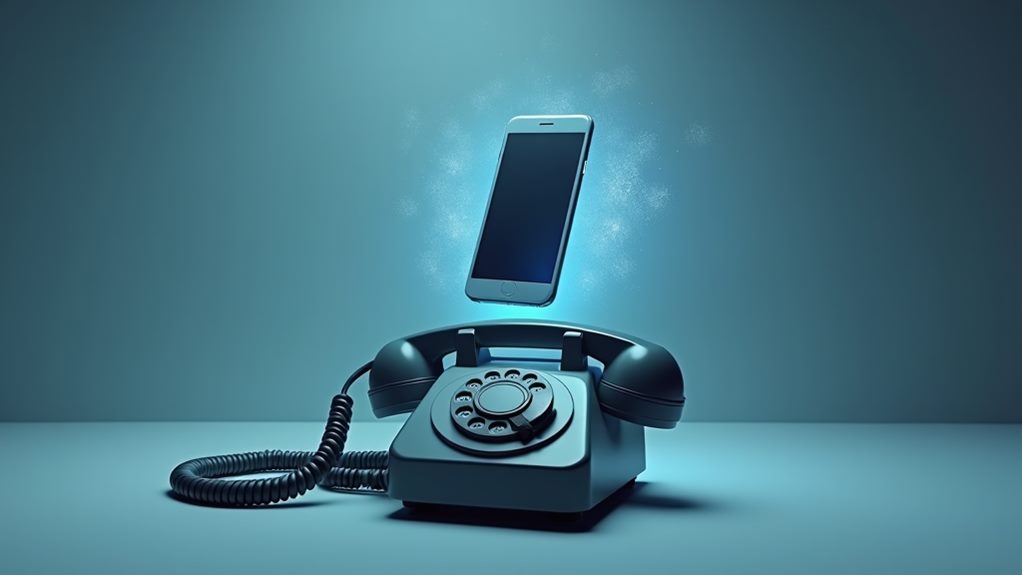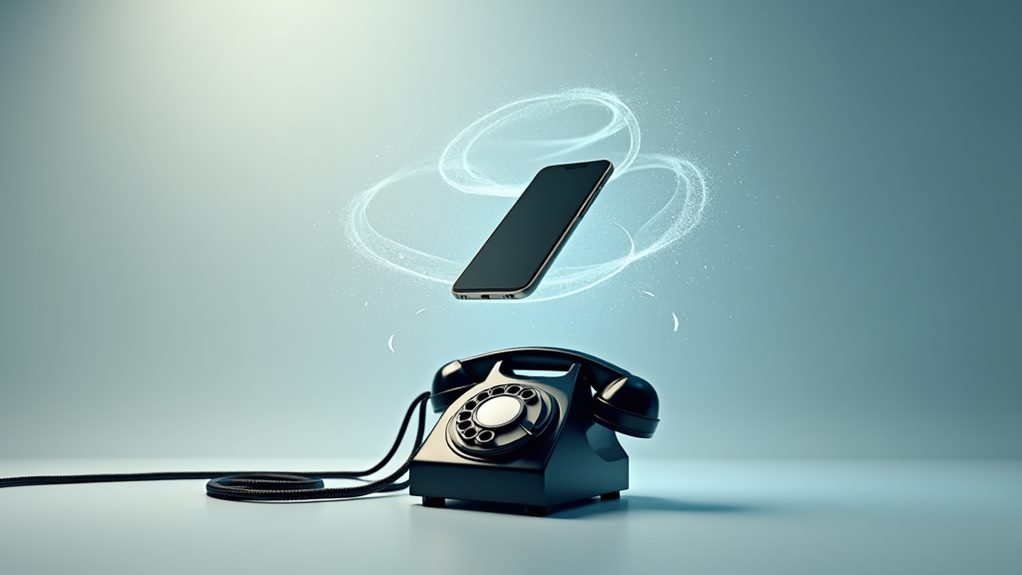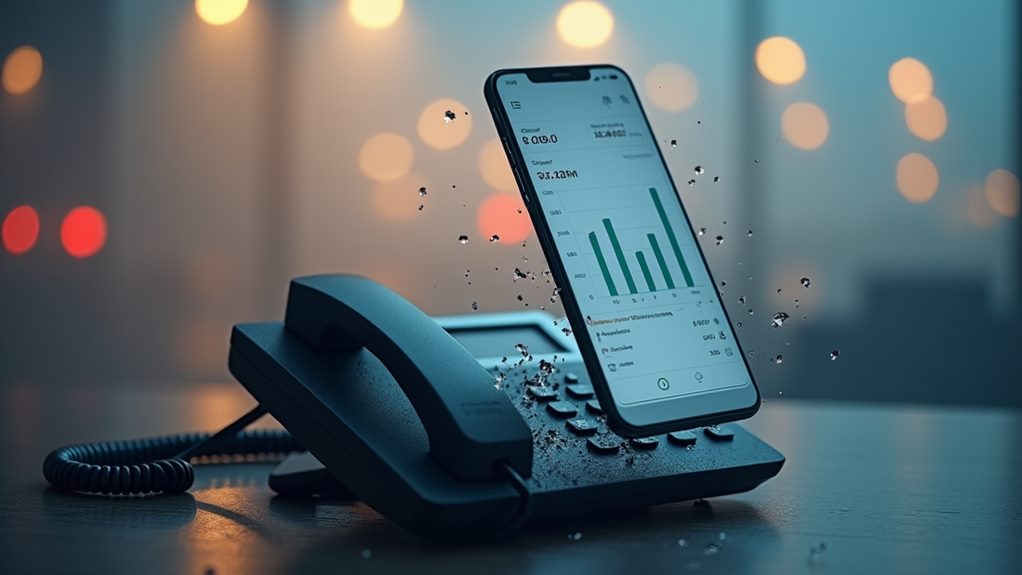Traditional landline phones will be replaced by Digital Voice technology using Voice over Internet Protocol (VoIP) by January 2027. You'll connect your existing phone to your broadband router using an adapter, keeping your familiar phone number. This digital transformation offers enhanced features like voicemail-to-email conversion, intelligent call routing, and call protection, while monthly costs remain similar at £20-£30. Major providers like BT and Virgin Media O2 have already begun moving customers to these systems, which provide better call clarity and cost-effective scalability. Understanding the timeline and equipment requirements will help guarantee a smooth changeover to this new technology.
Understanding Digital Voice Technology

The telecommunications landscape is undergoing a fundamental shift as Digital Voice technology, powered by Voice over Internet Protocol (VoIP), replaces traditional copper-wire landlines. This change not only promises enhanced clarity but also incorporates a range of advanced features, such as cost-effective scalability, that weren't possible with conventional systems.
You'll find that this transformation leverages your existing broadband connection to handle phone calls.
As you prepare for this change, you should know that major providers like BT and Virgin Media O2 are actively moving customers to Digital Voice platforms, with all traditional landlines being phased out by January 2027.
Don't worry about losing your familiar phone number – you'll keep it throughout the switch. Your existing landline phones will remain functional through adapters that your provider will supply, ensuring you stay connected with minimal disruption.
While VoIP technology offers superior call quality and modern features like voicemail-to-email integration, you'll need to think about backup power solutions.
Unlike traditional landlines, Digital Voice relies on your internet connection and power supply to function. During power outages, your phone service will only work if you've installed backup power measures, making this an important reflection for your household's communication strategy.
The End of Traditional Landlines
Traditional copper-wire landlines face imminent extinction as telecommunications providers worldwide accelerate their shift to digital networks, with a definitive PSTN switch-off date set for January 31, 2027.
The change to cost-effective VoIP technology won't only lead to enhanced communication quality but also introduce a range of advanced features through your existing broadband connection. You'll join millions of users adapting to VoIP technology, which offers enhanced communication quality and advanced features through your existing broadband connection.
The timing couldn't be more critical, as traditional landline networks have experienced a 20% surge in service incidents throughout 2023. You'll need an active internet connection to make calls after the switch-off, but don't worry about your current phone equipment. Your provider will guarantee a smooth changeover by supplying necessary adapters if you're still using analogue devices.
You're part of a global movement, following the successful digital transformations in countries like Japan and Germany. The switch from traditional PSTN to digital services represents more than just technological progress – it's about joining a more reliable, feature-rich communication network.
While the end of conventional landlines might feel significant, you're moving toward a more stable platform that integrates seamlessly with modern communication needs, supported by your telecommunications provider every step of the way.
Benefits of VoIP Systems

With VoIP systems, you'll access a suite of advanced features that transform everyday communication into a powerful business asset. You'll notice enhanced call clarity while gaining essential tools like voicemail-to-email conversion, intelligent call routing, and protection against unwanted calls – capabilities that traditional landlines simply can't match.
Additionally, VoIP provides the benefit of lower installation costs and bundled services like conferencing, enhancing the overall value (Cost Savings and Affordability).
Your phone services become truly mobile with VoIP's unmatched portability. You're no longer tethered to a desk phone; instead, you can manage calls from your smartphone, laptop, or tablet wherever you have internet connectivity. This flexibility helps you stay connected with your team and customers without compromise.
The switch to VoIP systems greatly reduces your communication costs by leveraging your existing internet infrastructure. You'll eliminate expensive hardware investments and maintenance fees associated with traditional landlines while gaining advanced capabilities like detailed call analytics and CRM integration.
These tools drive operational efficiency by providing insights into your customer interactions and team performance. Your business can now make data-driven decisions about communication strategies while maintaining professional standards across all channels.
When you combine these benefits with reduced operating expenses, VoIP emerges as the clear successor to aging phone infrastructure.
Power Outages and Emergency Calls
During power outages, digital landline systems present unique challenges that require careful consideration for emergency preparedness. If you're shifting to digital landlines or VoIP services, you'll need to understand that these systems won't function during power failures unless you've installed a battery backup unit.
You'll find that telecoms providers are required to support vulnerable customers by offering resilience solutions at no cost. This guarantees you'll maintain uninterrupted access to emergency services when the power goes down.
If you're relying on emergency devices or telecare systems, you'll want to verify their compatibility with your digital setup, as some equipment may need upgrades to work properly.
While digital landlines may lose service during outages, you can still make emergency calls through mobile networks if there's available signal coverage. It's crucial to plan ahead by discussing backup options with your provider, especially if you're in a vulnerable category.
You'll want to confirm your home maintains emergency communication capabilities by having multiple contact methods ready. Remember that providers must comply with Ofcom's regulations to maintain emergency service access, giving you peace of mind during critical situations.
Equipment Changes and Compatibility

Beyond emergency considerations, equipment compatibility stands at the forefront of the digital landline conversion. Your existing landline phone won't become obsolete – you'll simply need to connect it to your broadband router using an adapter that your provider will supply.
Major VoIP providers, including BT, Virgin Media, Sky, and TalkTalk, are covering approximately 85% of UK landline services with these essential adapters.
If you're among the remaining 15% of users, you'll need to verify adapter availability with your provider to guarantee seamless compatibility during the conversion.
The switchover affects more than just phones – you'll want to assess your connected devices, including telecare systems, security alarms, and payment terminals. These devices may require upgrades or specific adaptors to function properly with the new digital infrastructure.
Don't worry about losing your familiar phone number – you'll keep it throughout the conversion. Your provider will handle the porting process automatically, making this aspect of the switchover hassle-free.
Remember to check your broadband connection quality, as it'll now be the backbone of your landline service.
Timeline for National Switchover
The landmark changeover from traditional landlines to digital services follows a precise timeline, culminating in the January 31, 2027 deadline. Your telephone provider will guide you through this Digital Changeover as the UK moves away from the traditional landline network toward VoIP services.
Key dates in the changeover process that you'll need to be aware of:
- September 2023: PSTN landline sales ceased nationwide, marking the first major milestone in the digital transformation.
- Spring 2025: Providers will begin contacting vulnerable customers to guarantee proper support during the changeover.
- December 2025: Initial target date, now extended to provide more thorough coverage.
- January 31, 2027: Final deadline for complete migration to digital technology.
You're part of this nationwide upgrade, and your provider will contact you with specific dates for your area's changeover.
If you're among those who rarely use your landline, you might be among the first to receive notification from providers like BT.
This systematic approach assures everyone's connected to the new digital technology while maintaining essential communication services throughout the changeover period.
Costs and Service Providers

You'll find the monthly costs for digital landline services remaining stable as major providers like BT and Virgin Media O2 maintain pricing consistency with current contracts during the changeover.
The essential basic line-only broadband packages, required for digital voice functionality, will cost similar to existing line rental fees, while providers representing 85% of UK landline services will supply compatible adapters for your current phones.
Your existing phone number can be transferred at no additional cost, though businesses should contact their service providers to understand specific equipment upgrade requirements and associated VoIP changeover expenses.
Monthly Service Plans Comparison
Major providers across the UK now offer digital landline service plans ranging from £20 to £30 monthly, typically bundled with broadband connectivity.
When you're evaluating VoIP services from providers like BT, Virgin Media O2, Sky, and TalkTalk, you'll find competitive packages that let you keep your existing phone numbers while adding modern features.
To make an informed decision on monthly service plans, consider these key factors:
- Basic line-only broadband plans cost similar to traditional landline offerings but provide enhanced digital capabilities.
- Higher-speed broadband plans improve VoIP performance but come at a premium price point.
- Promotional discounts for new customers often include free installation and service add-ons.
- Additional features like voicemail to email and call waiting may affect your monthly costs.
Your choice should align with your specific needs, particularly regarding call volumes and internet usage patterns.
While providers bundle VoIP services with broadband plans, you'll find various pricing tiers based on speed and features.
Compare installation costs, contract lengths, and promotional periods across phone providers to secure the most cost-effective solution for your household or business requirements.
Provider Equipment Setup Costs
Moving from monthly service plans to equipment considerations, initial setup costs can greatly impact your overall investment in digital landline services.
When moving to VoIP technology, you'll need to evaluate your current equipment's compatibility with these new digital services. Major providers like BT, Virgin Media O2, Sky, and TalkTalk are streamlining the shift by providing necessary adapters for your existing landline phones.
While these providers aim to maintain pricing consistent with current contracts, you may encounter additional charges if you need a new router or equipment upgrades. Your setup costs will largely depend on your chosen provider's specific requirements and your existing infrastructure.
To manage your equipment costs effectively, start by checking your devices' compatibility with VoIP services.
Contact your provider to understand what adapters or equipment they'll supply as part of your service package. Remember that while providers are working to minimize shift expenses, older technology might require replacement, affecting your total setup investment.
Most providers offer detailed breakdowns of installation charges and equipment requirements, helping you plan your budget for the move to digital services.
Security and Scam Prevention
With the accelerating shift toward digital landlines, security threats and scam tactics have emerged as significant concerns for consumers. During this digital change, you'll need to stay vigilant and informed about protecting your telephone line from potential fraud.
Ofcom and GOV.UK provide essential resources to help you navigate these challenges while maintaining your security.
To protect yourself during this change, follow these significant steps:
- Apply the STOP principle – pause and evaluate before sharing any personal information over your telephone line.
- Contact the free support line at 0800 678 1602 between 8am-7pm for guidance on suspicious activities.
- Report any encountered scams to your bank immediately and maintain detailed records.
- Share awareness with your community to create a stronger defense against fraudulent schemes.
You're part of a nationwide movement toward digital communications, and staying informed about security measures is vital.
Keep yourself updated through official channels, and don't hesitate to seek support when needed. By maintaining awareness and following established protection protocols, you'll help guarantee a safer digital change for yourself and fellow consumers.
Final Thoughts
Moving from landlines to VoIP isn't just a technological shift – it's a market necessity. You'll need to evaluate your digital voice options, upgrade your equipment, and understand new security protocols. As telecoms phase out copper networks by 2025, you're facing a choice between fiber-based services, cellular solutions, or internet telephony. Your changeover costs will vary from $20-100 monthly, depending on your selected service provider and features.

